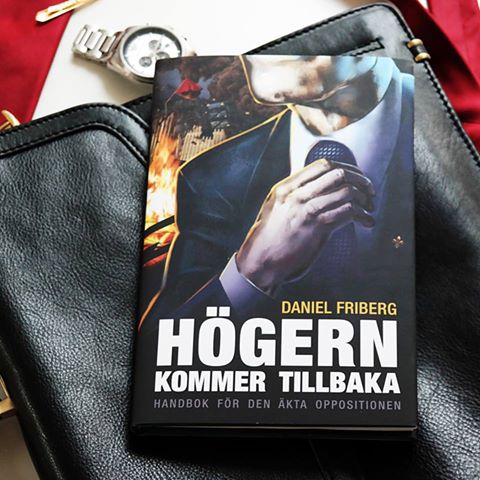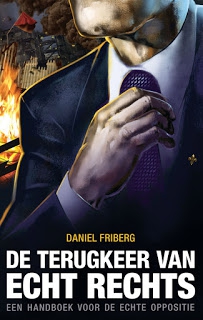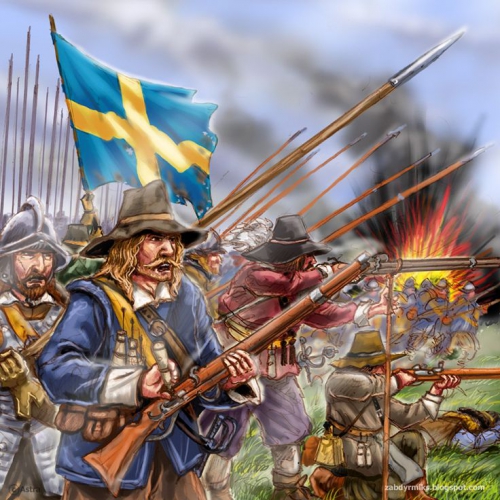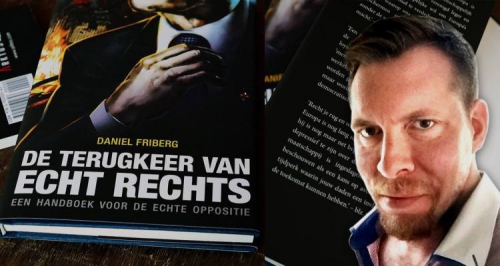Review:
Daniel Friberg
The Real Right Returns: A Handbook for the True Opposition [2]
London: Arktos, 2015
As with any revealed religion, you have to be skeptical when a political text promises to show you the Way. Ah, so you know a secret about power relations in society that isn’t apparent to the naked eye? Where have we heard that before, Comrade?
Daniel Friberg’s recent mini-hit The Real Right Returns [3]—billed as “A Handbook for the True Opposition”—sounds, at first glance, a bit too historically inevitable.
But (disclosure) I’ve been working with Friberg at his new website Right On [4] for a couple of months, and he seems down-to-Earth. He told me The Real Right focuses on European cultural preservation from a Swedish viewpoint, a subject about which I know far too little, so I figured at least I would learn something if I gave it a chance. (Also, I will dip into anything if you send it to me free of charge.)
As it turns out—though the Swedish mainstream will tell you that every native Swede who questions the Left is a kerosene-breathing Nazi sideshow freak—this is one of the most well-moderated, least ideologically shrill books I’ve read about politics. Though it is charming, with a clear and wry wit, there’s precious little of the messianic; in fact, it works hard to debunk the more mystical facets of contemporary politics—including White exceptionalism—in favor of common sense and paying attention to the facts on the ground.
For instance: even as millions of people who do not speak European languages pour into their continent, why is it still unthinkable to suggest that European peoples defend themselves, as we concede everyone else the moral right to do? As humorous podcaster The Bechtloff [5] likes to say: I know people hate it when you say that Liberals are “the real racists,” but . . . they kind of are.
What besides racism would lead you to assert that White people are especially powerful and evil? Why would you assume that White countries, in their infinite might, are immune to hostile invasion and colonization—and that all other groups are packs of lambs to be led dopily off to slaughter? Sub specie aeternitatis, these ideas will seem as goofy a few decades hence as thinking Black people have magic voodoo powers—especially if native Europeans are thoroughly overrun, as per the most dire predictions, and reduced to living on reservations and dancing polkas in Lederhosen for Chinese tourists between downing bottles of rubbing alcohol. Won’t we feel silly then?
As a White American, perhaps I failed to grow up on the magical dirt of the homeland and absorb its juju, but my experience is this: I don’t have any evil wizard powers, or any other supernatural attributes; I seem to be as vulnerable as anyone to death, domination, and especially taxes. Only a strange and noxious combination of white supremacy and white guilt would make me try to claim otherwise (as much as I enjoy those dreams where you can fly and shoot fire out of your eyes).
As Bill Burr said at Thanksgiving about the Native Americans: they really screwed up when they didn’t let the Pilgrims starve. And European White Leftists, in their smug belief in their own all-powerfulness, seem to have failed to learn anything from the Indians’ mistake. “You can’t be racist against White people, because we are as gods!”
Friberg, on the other hand, despite being an irrational bigot himself in the eyes of the Left, tends to think of White Europeans as just another ethnic group. This group faces, has faced, and will continue to face the same dangers and pressures as any other in history, with the same right to defend itself, but with no guarantee that it will go on existing; Friberg happens to love it because it is his. Which is pretty ordinary for a primate, like it or not.
In fact, in the educational glossary of metapolitics included in the book, Friberg shares Alain de Benoist’s term for the New Right’s version of anti-racism: differential anti-racism, as opposed to the Left’s universalist version.
Differential anti-racism is the answer of the New Right . . . to what is viewed as a lack of respect for differences which is characteristic of universal anti-racism. . . . Benoist proposes a differential anti-racism that opposes racial hierarchies and respects the differences between different peoples. He rejects all attempts to assign value judgments such as ‘better’ or ‘worse’ to races.
Such a wild idea: that peoples should respect each other’s differences without having to crawl up inside each other’s infidel fundaments. Friberg argues for the preservation of European culture, but not at the expense of everyone else; his prescription for avoiding external entanglements, for example, should fit any sane person’s politics, both pragmatically and morally:
The fanatical group of warmongers who, while mouthing platitudes about human rights and democracy, kill millions throughout the world . . . must be deprived of any influence on the foreign policy of the West. Opinions on the way other peoples handle their affairs should be expressed solely through diplomacy and example, not through the wars of aggression and attempts at subversion which time and again in recent decades have come back to haunt us.
On the other hand:
Mass immigration to Europe must cease. The Americanisation and the importation of stupid political ideas and an infantilizing popular culture must be limited.
My fellow Americans: we’re right up there with the jihad.
(I’m not entirely joking; for more in this vein, check out the chapters on Americanization in Éric Zemmour’s Le Suicide français [6].)
The main strategic thrust of the book is metapolitics, which Friberg defines as “a war of social transformation, at the level of worldview, thought, and culture”; metapolitics must be dealt with before anyone can tinker with political power.
Friberg cites Gramsci’s Prison Notebooks as a crucial source for the Left’s success on this turf—and also as a source from which the Right can learn. Till now the Left has painted anything outside its accepted range of thought as nefastus: hateful, filthy, and most important, unholy. The concepts of fastus (holy) and nefastus [7] have been primal to human social behavior for a very long time; without them we would have died from rolling in our own feces. But when they’re attached to political ideas, then even where there is nominal free speech, they choke the debate. Thus the Right must work to remove the stigma of nefastus from any and all political ideas within the culture—preferably in order to transfer the stigma to those who would gag their enemies with it.
Though the volume is a lean 117 pages, Friberg crams in a primer on the history and prehistory of the contemporary European Alt-Right, and the slow rise of oppositional metapolitics in Sweden. But he also offers two separate and refreshing guides to reclaiming your power as a man or as a woman. In the name of freeing us from gender roles, postmodernity has crammed us into a unisex mold that fits nobody, and an invitation to escape it is a relief.

There’s a gem of observation on nearly every page; I don’t stick my neck out and say such things lightly (or out of cronyism). Friberg is even moderate when it comes to everyone’s favorite false dichotomy: Laissez-faire or socialism? Instead of harping on the glories of untrammeled market jungle-craft or the evils of unequal outcomes, he echoes de Benoist’s affection for economic pragmatism:
Economics is not the absolute fundament of society, and a dogmatic approach to its functions is never prudent. Alain de Benoist’s words are ours as well: we’ll gladly welcome a society with a market, but not a market society. Conversely, demands for economic equality for the people of Europe for its own sake must not be allowed to limit the positive, wealth-generating effects of market forces.
He points out the failure of Marxist income redistribution in no uncertain terms, however. Instead of taking from the rich and giving to the poor, modern socialism has taken from the middle, working classes to dole out booty to the poor and the rich alike. Despite the Left’s stranglehold on discourse, it “achieves little more than to fill the role of global capitalism’s court jester.”
He goes on to note that the Right here has a tactical advantage in that its ideas are more in tune with regular people’s experience, by contrast with the airy-fairy, top-down Utopias of the Left. (The fact that the Left has parted ways with free speech in Europe doesn’t help their cause either.)
What he hints at but doesn’t spell out is the fact that, in vital ways, the Left has swung further right than the Right, if by right you mean Libertarian—for example, in its merciless cheerleading for globalized economic liberalism and the devastation of the Western working livestock.
In a healthy social order, genuine and sincere Left and Right partisans work to balance each other’s more extreme tendencies. In a hellscape such as ours, opportunists wave the “Left” and “Right” team flags, shouting platitudes. They cobble together whatever bits of each ideology will score them the most points with the super-wealthy while drawing enough voters to the booths to make the eerie puppet of democracy jerk its legs about.
The Left appears to be so detached from reality that they’re beyond hope. But Friberg offers a prescription for a healthy and vital Right. I’m no optimist, but there’s a slim chance this may succeed.
Related
 Is het tegenwoordig nog wel mogelijk de opvattingen van politiek links en de tegenhangers ter rechterzijde nog enigszins samen te vatten of zelfs te begrijpen? Het lijkt erop dat in het verlengde van het Amerikaanse propagandaverhaal van Francis Fukuyama, die de overwinning van de liberale democratieën verkondigde, enkel nog maar bewegingsruimte is binnen de beperkte reikwijdte van deze liberale democratie. Omdat het model van de liberale democratie, zeker in West-Europa en de V.S.A., als overwinnaar uit de bus is gekomen en vanaf het einde van de Tweede Wereldoorlog de politieke werkelijkheid domineert. Alle invloedrijke ideologieën, liberalisme, socialisme en christen-democratisme, zijn gericht om het te maken binnen dit restrictieve kader.
Is het tegenwoordig nog wel mogelijk de opvattingen van politiek links en de tegenhangers ter rechterzijde nog enigszins samen te vatten of zelfs te begrijpen? Het lijkt erop dat in het verlengde van het Amerikaanse propagandaverhaal van Francis Fukuyama, die de overwinning van de liberale democratieën verkondigde, enkel nog maar bewegingsruimte is binnen de beperkte reikwijdte van deze liberale democratie. Omdat het model van de liberale democratie, zeker in West-Europa en de V.S.A., als overwinnaar uit de bus is gekomen en vanaf het einde van de Tweede Wereldoorlog de politieke werkelijkheid domineert. Alle invloedrijke ideologieën, liberalisme, socialisme en christen-democratisme, zijn gericht om het te maken binnen dit restrictieve kader.




 Zopas kreeg ik ter bespreking de Nederlandse vertaling aangeboden van het boekje van de Zweedse mijnbouwondernemer en oppositieleider Daniel Friberg: De Terugkeer van Echt Rechts. Een Handboek voor de Echte Oppositie (Arktos, London 2016). In zijn geval is het Nieuw-Rechtse gedachtengoed ontdekt en relevant geworden vanuit de praktijk, een heel andere setting dan de Parijse salons. Zweden was schijnbaar de slechtste plaats ter wereld voor een tegenbeweging tegen de opdringende multiculturele staatsideologie. Voor de beginnende Zweedse Democraten was het jarenlang een harde strijd. Hun enige kracht was de zekerheid dat zij gelijk hadden, dat zij een terugkeer naar de normaliteit nastreefden tegen de tegennatuurlijke utopieën van de almachtige cultuurmarxisten in.
Zopas kreeg ik ter bespreking de Nederlandse vertaling aangeboden van het boekje van de Zweedse mijnbouwondernemer en oppositieleider Daniel Friberg: De Terugkeer van Echt Rechts. Een Handboek voor de Echte Oppositie (Arktos, London 2016). In zijn geval is het Nieuw-Rechtse gedachtengoed ontdekt en relevant geworden vanuit de praktijk, een heel andere setting dan de Parijse salons. Zweden was schijnbaar de slechtste plaats ter wereld voor een tegenbeweging tegen de opdringende multiculturele staatsideologie. Voor de beginnende Zweedse Democraten was het jarenlang een harde strijd. Hun enige kracht was de zekerheid dat zij gelijk hadden, dat zij een terugkeer naar de normaliteit nastreefden tegen de tegennatuurlijke utopieën van de almachtige cultuurmarxisten in. In de buitenlandse politiek beveelt hij zelfbeheersing en omzichtigheid aan. Europa heeft een militaire poot nodig om geloofwaardig in het machtspolitieke spel te kunnen meespelen, maar niet om zich naar Amerikaans voorbeeld met andermans conflicten te moeien. Hij verzet zich tegen 'de fanatieke oorlogsstokers die, terwijl ze clichés uitgalmen over mensenrechten en democratie, miljoenen mensen doden over heel de wereld en tegelijkertijd dezelfde retoriek gebruiken om massa-immigratie vanuit de Derde Wereld naar Europa aan te moedigen.' (p.28)
In de buitenlandse politiek beveelt hij zelfbeheersing en omzichtigheid aan. Europa heeft een militaire poot nodig om geloofwaardig in het machtspolitieke spel te kunnen meespelen, maar niet om zich naar Amerikaans voorbeeld met andermans conflicten te moeien. Hij verzet zich tegen 'de fanatieke oorlogsstokers die, terwijl ze clichés uitgalmen over mensenrechten en democratie, miljoenen mensen doden over heel de wereld en tegelijkertijd dezelfde retoriek gebruiken om massa-immigratie vanuit de Derde Wereld naar Europa aan te moedigen.' (p.28)
 del.icio.us
del.icio.us
 Digg
Digg






